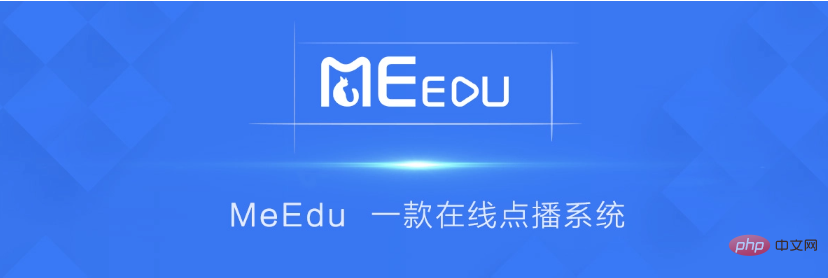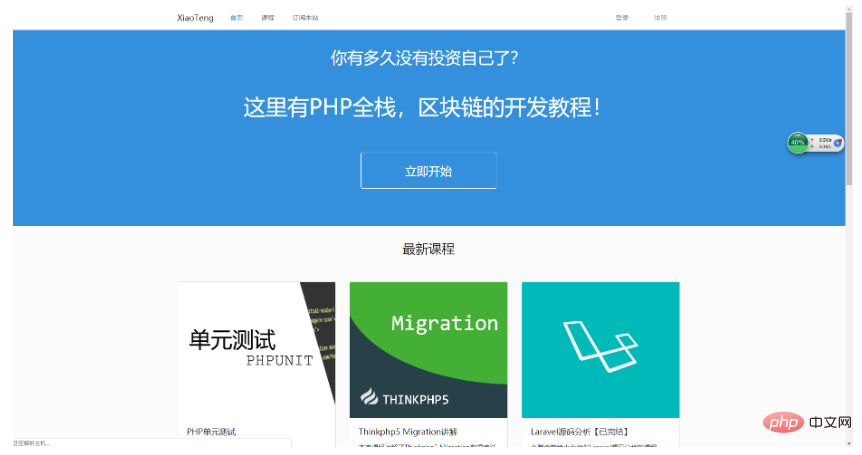MeEdu, an online on-demand system developed based on Laravel
The following tutorial column from laravel will introduce to you the online on-demand system "MeEdu" developed based on Laravel. I hope it will be helpful to friends in need!

https://github.com/Qsnh/meedu
Author’s Foreword:
With the rise of the field of knowledge payment, especially the success of "get", the leader in the field of knowledge payment, the field of knowledge payment has become a new trend. After several years of development, the infrastructure in the field of knowledge payment has made great progress. Many knowledge payment platforms on the market can build their own set of knowledge payment applications in just a few minutes. However, this is not what I want! Perhaps from a programmer's perspective, what I care more about is that I can fully control this application!
So MeEdu was born. MeEdu has pinned my expectations on the current field of paid knowledge. I believe that in the future, everyone with skills can use MeEdu to build their own paid knowledge applications and monetize their knowledge through MeEdu.
Installation Tutorial
Environment Requirements
Composer
PHP >= 7.2
MySql >= 5.6
Zip PHP Extension
OpenSSL PHP Extension
PDO PHP Extension
Mbstring PHP Extension
Tokenizer PHP Extension
XML PHP Extension
Step
Step 1
Install meedu
composer create-project qsnh/meedu=dev-master
Step 2
Configure the database, open the .env file, and modify the following content:
DB_CONNECTION=mysql DB_HOST=127.0.0.1 DB_PORT=3306 DB_DATABASE=homestead DB_USERNAME=homestead DB_PASSWORD=secret
Configure basic information
APP_NAME=MeEdu APP_ENV=local(这里如果正式运行,请修改为:production) APP_KEY= APP_DEBUG=true(这里如果是正式运行,请修改为:false) APP_LOG_LEVEL=debug APP_URL=http://localhost(这里修改你自己的地址)
Step 3
Create a soft link to the upload directory:
php artisan storage:link
Step 4
Set the storage directory permissions to 777
chmod -R 0777 storage
Step 5
Configure pseudo-static and set the running directory of meedu to public.
Pseudo-static rules (Nginx):
location / {
try_files $uri $uri/ /index.php$is_args$query_string;
}Step 6
Install data table
php artisan migrate
Step 7
Initialize system permissions:
php artisan install role
Initialize administrator:
php artisan install administrator
The installation prompts you to enter the administrator’s account and password!
Initialize the background menu:
php artisan install backend_menu
Generate the installation lock (this step is crucial)
php artisan install:lock
Step 8
Go here , the website can be accessed normally. But if you want the entire program to run completely, subsequent configuration is required.
Backend login address: http://youdomain.com/backend/login
Step 9
Configure task scheduler:
Add the following content to the crontab scheduled task:
* * * * * php /path-to-your-project/artisan schedule:run >> /dev/null 2>&1
Note that the path is replaced with the path where meedu is located
Step 10
Configure the queue Listener:
First, install supervisor:
sudo apt install supervisor
Configure supervisor
cd /etc/supervisor/conf.d vi meedu.conf
Paste the following content in:
[program:meedu] process_name=%(program_name)s_%(process_num)02d command=php /you-project-path/artisan queue:work --sleep=3 --tries=3 autostart=true autorestart=true user=root numprocs=4 redirect_stderr=true stdout_logfile=/you-project-path/storage/logs/supervisor.log
Be careful to replace the path and user
Restart the service:
sudo supervisorctl reread sudo supervisorctl update sudo supervisorctl start meedu:*
If the configuration is correct, you will see the supervisor's output log, and the log path is the value of stdout_logfile configured above.
Demo

##Original address: https://xueyuanjun.com/post/9827
The above is the detailed content of MeEdu, an online on-demand system developed based on Laravel. For more information, please follow other related articles on the PHP Chinese website!

Hot AI Tools

Undresser.AI Undress
AI-powered app for creating realistic nude photos

AI Clothes Remover
Online AI tool for removing clothes from photos.

Undress AI Tool
Undress images for free

Clothoff.io
AI clothes remover

AI Hentai Generator
Generate AI Hentai for free.

Hot Article

Hot Tools

Notepad++7.3.1
Easy-to-use and free code editor

SublimeText3 Chinese version
Chinese version, very easy to use

Zend Studio 13.0.1
Powerful PHP integrated development environment

Dreamweaver CS6
Visual web development tools

SublimeText3 Mac version
God-level code editing software (SublimeText3)

Hot Topics
 PHP vs. Flutter: The best choice for mobile development
May 06, 2024 pm 10:45 PM
PHP vs. Flutter: The best choice for mobile development
May 06, 2024 pm 10:45 PM
PHP and Flutter are popular technologies for mobile development. Flutter excels in cross-platform capabilities, performance and user interface, and is suitable for applications that require high performance, cross-platform and customized UI. PHP is suitable for server-side applications with lower performance and not cross-platform.
 How to use object-relational mapping (ORM) in PHP to simplify database operations?
May 07, 2024 am 08:39 AM
How to use object-relational mapping (ORM) in PHP to simplify database operations?
May 07, 2024 am 08:39 AM
Database operations in PHP are simplified using ORM, which maps objects into relational databases. EloquentORM in Laravel allows you to interact with the database using object-oriented syntax. You can use ORM by defining model classes, using Eloquent methods, or building a blog system in practice.
 Analysis of the advantages and disadvantages of PHP unit testing tools
May 06, 2024 pm 10:51 PM
Analysis of the advantages and disadvantages of PHP unit testing tools
May 06, 2024 pm 10:51 PM
PHP unit testing tool analysis: PHPUnit: suitable for large projects, provides comprehensive functionality and is easy to install, but may be verbose and slow. PHPUnitWrapper: suitable for small projects, easy to use, optimized for Lumen/Laravel, but has limited functionality, does not provide code coverage analysis, and has limited community support.
 Laravel - Artisan Commands
Aug 27, 2024 am 10:51 AM
Laravel - Artisan Commands
Aug 27, 2024 am 10:51 AM
Laravel - Artisan Commands - Laravel 5.7 comes with new way of treating and testing new commands. It includes a new feature of testing artisan commands and the demonstration is mentioned below ?
 Comparison of the latest versions of Laravel and CodeIgniter
Jun 05, 2024 pm 05:29 PM
Comparison of the latest versions of Laravel and CodeIgniter
Jun 05, 2024 pm 05:29 PM
The latest versions of Laravel 9 and CodeIgniter 4 provide updated features and improvements. Laravel9 adopts MVC architecture and provides functions such as database migration, authentication and template engine. CodeIgniter4 uses HMVC architecture to provide routing, ORM and caching. In terms of performance, Laravel9's service provider-based design pattern and CodeIgniter4's lightweight framework give it excellent performance. In practical applications, Laravel9 is suitable for complex projects that require flexibility and powerful functions, while CodeIgniter4 is suitable for rapid development and small applications.
 How do the data processing capabilities in Laravel and CodeIgniter compare?
Jun 01, 2024 pm 01:34 PM
How do the data processing capabilities in Laravel and CodeIgniter compare?
Jun 01, 2024 pm 01:34 PM
Compare the data processing capabilities of Laravel and CodeIgniter: ORM: Laravel uses EloquentORM, which provides class-object relational mapping, while CodeIgniter uses ActiveRecord to represent the database model as a subclass of PHP classes. Query builder: Laravel has a flexible chained query API, while CodeIgniter’s query builder is simpler and array-based. Data validation: Laravel provides a Validator class that supports custom validation rules, while CodeIgniter has less built-in validation functions and requires manual coding of custom rules. Practical case: User registration example shows Lar
 PHP code unit testing and integration testing
May 07, 2024 am 08:00 AM
PHP code unit testing and integration testing
May 07, 2024 am 08:00 AM
PHP Unit and Integration Testing Guide Unit Testing: Focus on a single unit of code or function and use PHPUnit to create test case classes for verification. Integration testing: Pay attention to how multiple code units work together, and use PHPUnit's setUp() and tearDown() methods to set up and clean up the test environment. Practical case: Use PHPUnit to perform unit and integration testing in Laravel applications, including creating databases, starting servers, and writing test code.
 Laravel vs CodeIgniter: Which framework is better for large projects?
Jun 04, 2024 am 09:09 AM
Laravel vs CodeIgniter: Which framework is better for large projects?
Jun 04, 2024 am 09:09 AM
When choosing a framework for large projects, Laravel and CodeIgniter each have their own advantages. Laravel is designed for enterprise-level applications, offering modular design, dependency injection, and a powerful feature set. CodeIgniter is a lightweight framework more suitable for small to medium-sized projects, emphasizing speed and ease of use. For large projects with complex requirements and a large number of users, Laravel's power and scalability are more suitable. For simple projects or situations with limited resources, CodeIgniter's lightweight and rapid development capabilities are more ideal.






